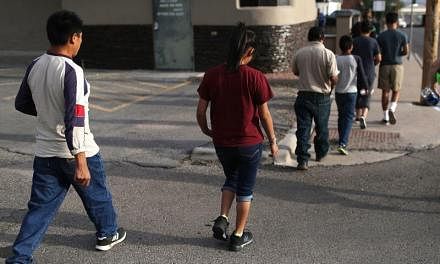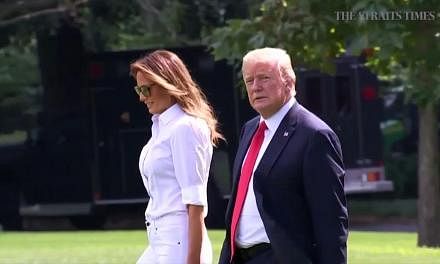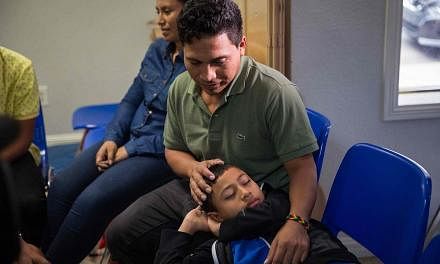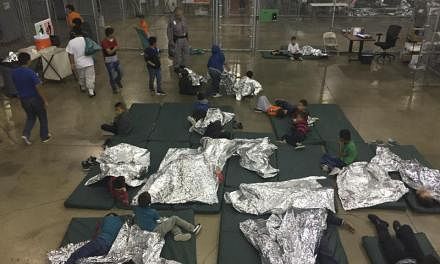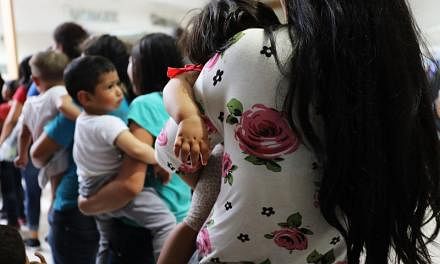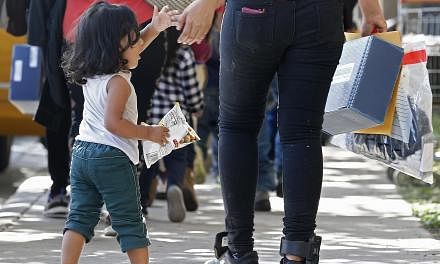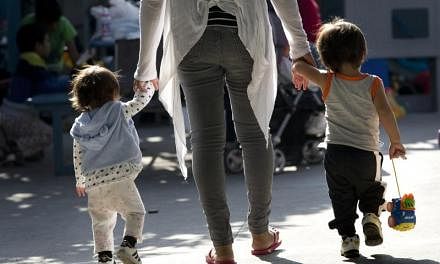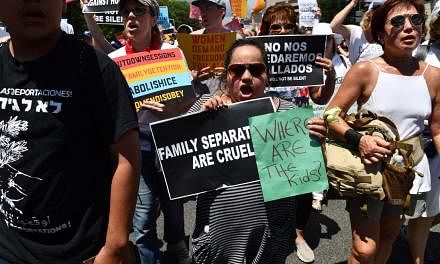ROME (WASHINGTON POST, REUTERS) - Pope Francis stepped into a growing controversy over President Donald Trump's immigration policies, criticising the separation of migrant families at the US-Mexican border and saying that "populism" and "creating psychosis" are not the way to resolve migration problems, according to an interview published on Wednesday (June 20).
Speaking to Reuters news agency, the Pope said: "It's not easy, but populism is not the solution."
He strongly backed US Catholic bishops, who have described as "immoral" the Trump administration's policy of discouraging illegal immigration by separating children from their parents at the border.
US authorities have sought to implement Mr Trump's "zero-tolerance" policy on illegal immigration by criminally prosecuting all migrants caught crossing the border without authorisation.
That has meant jailing adults and sending their children to government shelters. So far, about 2,000 children have been separated from their parents, prompting an outcry at home and abroad.
In the interview on Sunday night, the Pope also took aim at Italy's new populist government, which has been cracking down on asylum seekers attempting dangerous crossings by boat from Africa.
"I believe that you cannot reject people who arrive," Pope Francis said, according to Reuters.
"You have to receive them, help them, look after them, accompany them and then see where to put them, but throughout all of Europe."
He added: "Some governments are working on it, and people have to be settled in the best possible way, but creating psychosis is not the cure. Populism does not resolve things. What resolves things is acceptance, study, prudence."
Europe should stop exploiting Africa and invest in ways that benefit the continent more, including by sharing mineral wealth more equitably, Pope Francis said.
"We must invest in Africa, but invest in an orderly way and create employment, not go there to exploit it," he said in the interview, while discussing the migration of Africans to Europe.
"When a country grants independence to an African country, it is from the ground up - but the sub-soil is not independent. And then people (outside Africa) complain about hungry Africans coming here. There are injustices there!"
Touching on the reasons for hunger in Africa, the Pope said that "in our collective unconscious there is something inside us that says Africa must be exploited".
His comments follow moves in some African countries to win more generous terms from international mining companies.
In Democratic Republic of Congo, for example, the government has enacted a new mining code that is designed to earn extra money for the state from copper, cobalt and gold produced there.
Mining companies say the government should reconsider the law in order to respect exemptions that were granted by its predecessor.
The Pope said Europe needed to focus on education and investment in Africa if it wanted to stem the flow of migrants, which is also an increasingly divisive issue in Italy, where the new governing coalition is taking a hard line.
"And there's a problem," he added. "We send people back to those who have sent them here. They end up in the jails of traffickers."
The Pope then showed Reuters graphic photographs that he said showed victims of human trafficking who had been tortured and killed in an unspecified location in Africa.
Pope Francis also appealed for greater press freedom around the world, citing the case of two Reuters journalists jailed in Myanmar on accusations of possessing secret documents.
The Pope visited Myanmar last November and later, in neighbouring Bangladesh, had an emotional meeting with Rohingya refugees who had fled there from Rakhine state.
"The right to information is a right that must always be protected, and not only with regard to the Rohingya," Pope Francis told Reuters when asked about the reporters.
"States that have something they don't want to be seen, always stop the media and freedom of the press and we must fight for freedom of the press. We must fight."
Reporters Kyaw Soe Oo, 28, and Wa Lone, 32, have been held since December in what has become a landmark press freedom case, charged under the colonial-era Official Secrets Act. The alleged offences carry a maximum penalty of 14 years in prison.
At the time of their arrest, the pair had been working on an investigation into the killing of 10 Rohingya Muslim men and boys in a village in Myanmar's Rakhine state.
Myanmar government spokesman Zay Htay, asked to comment on the Pope's remarks, said on Wednesday that the judiciary was independent, as in other democratic countries.
"Currently, Reuters' case is a case which is still ongoing at the court. They will be released, if they are innocent. They will be punished if they committed a crime," he said.
"The government cannot interfere in the court proceedings."
Pope Francis said the situation surrounding the detention of the two Reuters reporters should be clarified.
"I would like that the reason why they are in prison be clarified. If they have committed a crime or not. But it is important that the situation be clarified," he said.
Without naming any countries, he decried attacks on press freedom by "so-called democratic" governments, saying bad decisions were sometimes made with "white gloves".
"In some places, dictatorial governments under the guise of democracy continue to do these things," he said.
"But right now the press can be very easily manipulated, very easily," he added. "In some countries maybe things are going well, but there are many ways to silence the media."

